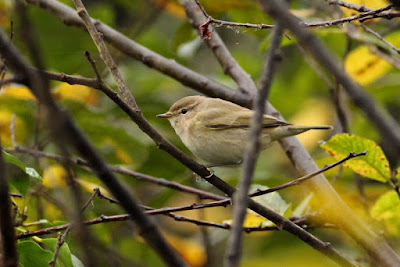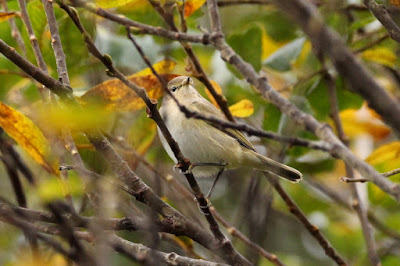Yesterday, this more colder looking Northern Willow Warbler turned up at Higher Moors to join the greener looking individual that has been present since the 18th October.
While at Higher Moors yesterday, I could hear the female Great-spotted Woodpecker at Holy Vale and immediately found it on the same tree that I observed it the day before. Again it showed very well at close range. I returned to Higher Moors and there were 15+Chiffchaff and 4 Firecrest. A nip across the road to Porth Hellick and there were 20+Chiffchaff, 1 Yellow-browed Warbler and 5 Firecrest.
Again note how short and stout the bill is on this Great-spotted Woodpecker. It is now thought that the buff wash on the underparts and forehead could be stained from the wood that it works on. Could this be a possible 'Northern' Great-spotted Woodpecker? Any comments welcome
Later in the afternoon I made a quick visit to Lower Moors where there were a single Siberian Chiffchaff, 4 Firecrest, 40+Chiffchaff and a male Merlin. At Newford I could only find a single Firecrest and flushed 3 Woodcock. I returned to Higher Moors and met up with Martin. No sign of the woodpecker, but low in the undergrowth I could see a very pale warbler and identified it as what I thought at first was the Northern Willow Warbler. However, this was a much colder looking individual giving the expression of a more greyer overcast upperparts and white underparts. No yellow tones could be observed on any of the plumage of this bird. I called Martin over, who was taking pics of the 4 male Siskin just a few meters away, but the warbler just vanished deeper into the undergrowth and was not seen again.
Here is compassion with the Northern Willow Warbler that's been present in the Higher Moors area for nearly three weeks. Note on the top bird the supercilium is paler, narrower and above the eye it's missing. While on the more greener looking individual below, the super is yellower, broader, prominent and unbroken, Every pic that I've taken of the long staying NWW, on both sides, shows an unbroken supercilium.

A new Northern Willow Warbler at Higher Moors and if you include the one that Jim trapped at nearby Porth Hellick, that's 3 Northern Willow Warblers in a week in the area
Another Siberian Chiffchaff this time at Lower Moors
A Chiffchaff with just one leg!
The 4 male Siskin were showing very well at Higher Moors
I only saw 4 Fieldfare today
Dave is still with us at work and getting a beating from the resident pair. By the end of October last year he moved on only to return in June this year.
BBC journalist comes clean, says “trust nothing you read or watch”
A BBC journalist, John Darvall, has lambasted his own career at the BBC. The insensitive way the tragic death of his daughter, Polly, has been handled by several outlets led him to lay bare his thoughts about the BBC and the British media industry as a whole, in a heartfelt blog post.
The BBC itself misreported specific information about his family, furthering their grief.
This poor piece of journalism made Tuesday probably the worst day of this whole episode so far.
This provoked wider criticism of traditional media from Darvall.
This week TV and newspapers have proven to me why they are not the future of news.
Darvall then hailed the internet as the bastion of real media.
The internet allows us to come to our own conclusions by checking our own facts. We really can’t trust the traditional outlets to do it right or properly.
He specified social media as the future of of news.
If they can’t even get their facts right, be trusted with clear information and then report it accurately is it any wonder that we are all turning to Facebook, Twitter and other internet sources for our news and information?
He said this of his own career:
I am ashamed to be a journalist.
And left us with a piece of advice:
Trust nothing you read or watch.
Can we trust the BBC?
The BBC is the envy of much of the world: a media free from vested interest; free to serve the public for the greater good. We observe the likes of Fox News in the USA and are thankful. A properly informed public is the foundation of any meaningful democracy, and a publicly owned media outlet can circumvent the position of the powerful as the ‘gatekeepers’ of information.
This is the concept of the BBC, but the reality is far from it. A major content analysis from Cardiff University reveals the BBC is in fact pro-business and conservative leaning in its coverage, contrary to George Osborne’s claims that the BBC has an ‘anti-business’ slant.
The study found that on BBC News at Six, business representatives outnumbered trade union spokespersons by a ratio of more than 5-to-1 in 2007, and of 19-to-1 in 2012. Research into the BBC coverage of the 2008 financial crisis revealed similar pro-business sentiment. Opinion was almost completely dominated by investment bankers, stockbrokers and other city voices.
Not only does the corporation give disproportionate voice to big business, but it gives Tories more airtime than Labour. When Gordon Brown was in power in 2007, his coverage exceeded that of David Cameron by a ratio of 2-to-1. This is to be expected: the current Prime Minister will get more airtime. But, in 2012 Cameron’s coverage exceeded that of Ed Miliband by double that ratio (4-to-1).
One might say Labour’s reluctance to put Miliband front and centre is the reason for this. However, the study found much the same disparity when comparing cabinet members and ministers to their counterparts in the shadow cabinet. Under a Conservative government in 2012, coverage of Tory ministers exceeded that of their Labour counterparts, again by more than 4-to-1. Meanwhile, under the 2007 Labour government, Labour ministers’ exceeded that of their Conservative counterparts, again by only 2-to-1. Factoring in who is presently in power, the Tories still get double the airtime Labour do.
A root cause of this is the way members of the BBC Trust are selected. The BBC Trust is the body that governs and regulates the corporation. Currently, the monarch appoints BBC Trust members on the advice of government ministers. This has led to a public service run by people with strong business and political affiliation.
Rona Fairhead was made Chairwoman of the BBC Trust on the recommendation of former Conservative culture secretary Sajid Javid. She serves on the board of directors of several large corporations, including PepsiCo and HSBC. She is also the business ambassador for the UK Trade and Investment governing body.
The Vice-Chairwoman, Diane Coyle, sits on the advisory panel for EDF and is managing director of ‘Enlightenment Economics’, an economic consultancy for large corporate clients, such as Vodaphone.
The presenter for the BBC’s flagship political programme Daily Politics is Andrew Neil, chairman of the conservative news outlet ‘The Spectator’ and publisher of London global business magazine, ‘The Business’.
The business editor is Kamal Ahmed of the right-wing Sunday Telegraph, who was rebuked by the Guardian’s Nick Davies for ‘banging the war drums’ over the invasion of Iraq.
We might avoid such disproportionate coverage were the regulatory body not spearheaded by tycoons. While they may not actively seek to advance a particular agenda, they are predisposed to the ideology behind their affiliations.
The BBC is worth fighting for. The concept is incredible, but it needs huge reform. The government should not simply dictate who sits on the regulatory body. The BBC Trust should be representative of the public it is supposed to serve, not the vested interest it is supposed to bypass.
When Darvall tells us to trust nothing we read in the media, his advice penetrates even the BBC, which is often considered the global standard of honest journalism.
Featured image via Tim Loudon.
Learn more and support The Canary by reading:
I prefer this live version of this song about a journalised going to cover the Vietnam War, than the the LP version 'Only Visiting this Planet' Larry David Norman (April 8, 1947 – February 24, 2008) was an American musician, singer, songwriter, record label owner, and record producer. He was considered to be one of the pioneers of Christian rock music,[3][4] and released more than 100 albums.

























Fabulous shots of the woodpecker!
ReplyDelete